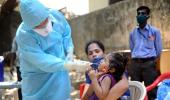'...If people follow the lockdown well.'

"When a spurt starts in such an outbreak, when you have an incubation period of about two weeks, you should expect that for the next three weeks you are bound to find more number of cases," Dr Raman Gangakhedkar, Head Scientist of Epidemiology and Communicable Diseases at the Indian Council of Medical Research, tells Rediff.com Senior Contributor Sheela Bhatt in the second segment of an exclusive three-part interview.
So many doctors and experts had been saying that India must test, test, test.
ICMR enforced such a protocol that the number of tests remained low.
Is it because we did not have enough number of test kits?
Please remember our testing criteria is similar to what you adopt in any country.
I can't say we were restrictive in terms of doing that.
Now, initially you could have said we had less number of virus research diagnostic labs which were offering tests.
But if you recall, we jumped straightaway from 31 to 60 labs, from 60 to 100 plus, far faster than you can imagine.
If you look at roping in private labs, we have even done that part.
So essentially, what does that mean? We have a huge network where we could provide access to patients. We have a sufficient amount of kits because I am repeatedly saying that even if the testing increases, we are sure that for the next 6 to 8 weeks we won't have any shortage whatsoever.
But then people ask why are we not testing more? See, if you have given the access and still people are not coming to you, with those criteria that have been laid down, then I cannot be blamed for that.
Basically, we have done everything. See it's like saying I have opened up a shop and people are not coming.
So, in other words, you are saying we didn't have actual COVID-19 patients.
Yes, at that point in time, because otherwise I cannot explain why people did not come.
Or it is possible that the stigma is so high that people don't feel like coming to labs or showing it to a doctor.
Even after the lockdown the cases double every 5 days. The lockdown should have reduced the number of patients, but it is doubling.
All of us know there were some minor hiccups that we had in between which led to a spurt of cases.
When a spurt starts in such an outbreak, when you have an incubation period of about two weeks, you should expect that for the next three weeks you are bound to find more number of cases.
Because, you are now going for a quality contact tracing, to find out who all could have probably acquired infections.
And that person, till the time you detect, is likely to be spreading infection elsewhere.
So numbers are bound to be higher. The numbers of patients will come down only after, to my mind, they should start stabilising sometime around 25th of April, if people follow the lockdown well.
The Mumbai incident was also another hiccup that we had.
So basically it's up to us as individuals to control the spread of the disease.
How stringently we follow is the key.
If we do that, I don't see why we cannot become Wuhan as one place where infection was controlled well.

Why is the death toll high in Maharashtra?
I wouldn't be able to comment because we have not got the complete data for Maharashtra itself.
But it is possible, since I come from Maharashtra, that the lifestyle and the age groups may be factors.
There may be people who may be having higher proportion chronic morbidities like diabetes and hypertension and that's the reason this must be happening.
Otherwise, if you ask me, Maharashtra tends to provide far good care, whether it is intensive care or whatever.
I don't think it is an issue related to the provision of healthcare.
Can we say that community transmission is present in Mumbai now?
See, we think what we are doing now, is thinking of community transmission as some kind of a severe threat.
There are two things that we have to understand.
When we say cluster is present, cluster is present in the community.
A single case that occurs is present in the community.
There, fear of spread is largely restricted to whatever contacts that I have amongst whoever I know.
Now if there are more number of clusters you will find they will have their own spheres.
As long as these circles are not crossing, it is managable.
People could have had acquired infection from any other source. No, you shouldn't be worried.
We are trying to be prepared for any eventuality at this juncture.
And if we are today prepared for eventuality, why should we be worried if one is classified as one or the other stage of infections?











 © 2025
© 2025